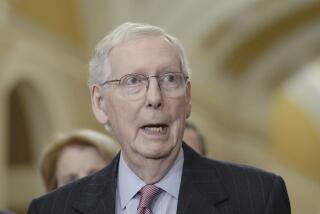Where Clinton and Obama divide
WASHINGTON — The Senate long has been considered a poor springboard to the White House. But it provided a crucial step in the political rise of Hillary Rodham Clinton and Barack Obama, giving them a priceless chance to burnish their records and shore up weaknesses before launching their presidential campaigns.
Clinton has used her seven years in the Senate to begin rehabilitating her reputation as one of the most polarizing figures in American politics and the architect of a failed healthcare plan. Obama’s brief tenure has allowed him to establish himself as a national figure in a way he never could have as a mere Illinois state legislator.
They took divergent approaches to their Senate careers, however. And their strategies reflected both their own political needs and the distinctive ways they tackle challenges -- differences that could ultimately make them very different presidents.
Clinton chose to build a reputation as a skilled insider: She mastered the levers of Senate power, developed a record of delivering for her state, and proved she could work effectively with diverse colleagues -- including Republicans who had demonized her as first lady.
Obama cast himself as more of an outsider: He challenged some of the Senate’s treasured ways of operating -- especially in the field of ethics. At the same time, he bulked up the foreign policy credentials he would need to run for president and cultivated the profile of a “post-partisan,” reform-minded politician.
The contrast between the candidates’ approaches to the Senate mirrors the choice now facing Democratic primary voters -- between Clinton’s emphasis on competence and kitchen-table issues, and Obama’s focus on broad themes and overarching issues.
But it does more than foreshadow campaign strategy. It gives voters an unusual glimpse into the kinds of presidents they might turn out to be.
Their Capitol Hill tours have not been without political risks. The Senate has a tradition of giving the cold shoulder to newcomers who arrive with glittering reputations and outsized ambitions but fail to defer to senior members. Even the appearance of failing to succeed in the Senate could have damaged Clinton’s and Obama’s White House chances.
Neither Clinton nor Obama can claim credit for groundbreaking legislation. They have partly been hampered by their relatively short tenure and by the fact that Democrats were in the minority until 2007. If major bills with a candidate’s name on it were the best test of leadership, Sen. John McCain (R-Ariz.) would win hands down: He has top billing on major campaign finance, immigration and global warming measures.
Clinton and Obama each arrived in the Senate in a spotlight. They were being asked if they planned to run for president even before they were sworn in.
Clinton was one of the best-known women in the country; Obama’s keynote speech at the 2004 Democratic Convention had brought down the house, and his memoir of his early life was a bestseller.
In a sign of the buzz over his 2005 arrival, Obama soon after was invited to don a tuxedo and speak at a dinner of the Gridiron Club, an insiders’ press event.
“I am so overexposed, I make Paris Hilton look like a recluse,” Obama joked. The challenge was to show that he had substance too.
She keeps her head down
Clinton’s challenge was different: A decade-long national reputation preceded her, but she was loathed by many Republicans as the embodiment of liberalism and the face of socialized medicine because of her role in President Clinton’s ill-fated healthcare plan.
Members of both parties feared she would be a prima donna and treat the Senate as a mere springboard to the White House.
Clinton surprised her colleagues with her diligence and deference. One of the earliest examples of her strategy involved fellow Democrat Robert C. Byrd of West Virginia, the most senior member of the Senate.
Not long after she won her seat in 2000, the former first lady approached Byrd as a humble student seeking lessons in the arcane ways of the tradition-bound institution. It was a gutsy gesture, because the powerful Senate elder had been openly hostile to President Clinton after his scandalous dalliance with a White House intern.
After a series of private tutorials, Sen. Clinton won Byrd as an ally. Months later, after the Sept. 11 attacks, he helped her secure $20 billion in aid for her state. “Count me in as the third senator from New York,” he said.
Clinton’s insider game also was reflected in the way she shunned the national press and deflected questions about her presidential ambitions during much of her first term. She focused on issues of concern to her New York constituents -- which helped her counter complaints that she, an Illinois native, was a carpetbagger.
Hoping to detoxify her reputation among Republicans, she charmed conservatives into cosponsoring legislation on consensus issues. She even found common cause with Republicans who had once led the impeachment drive against her husband -- Sen. Lindsey Graham (R-S.C.) on veterans benefits; former House Speaker Newt Gingrich on health policy; then-Rep. Tom DeLay (R-Texas) on promoting foster care.
She also joined one of the Senate’s private weekly prayer groups, a move that allowed her to build bridges to the many conservative Republicans and show a religious side that is rarely recognized.
Clinton clearly delighted in the lawmaking process. But the hallmark of her first term was what she achieved for New York after Sept 11: securing aid for the stricken city, derailing efforts to close military bases in the state and winning hundreds of millions of dollars in earmarked funding for local projects.
The base-closing victory was a tribute, in part, to the clout and expertise she gained as a member of the Senate Armed Services Committee, an assignment that also helped establish her bona fides on military matters.
On her signature issue of healthcare, she learned from the collapse of her ambitious plan in the 1990s. She focused on incremental measures, such as increased regulation of pediatric drugs and health benefits for veterans of the National Guard. She has called her strategy “the school of smaller steps.”
He makes a splash
Obama’s initial approach to the Senate bore similarities to Clinton’s, but there were telling differences.
He too made a pilgrimage to see Byrd, but the first time he heard Byrd speak -- on the Senate’s history and traditions -- an admiring but conflicted Obama pondered the fact that this was an institution that for much of its history did not include blacks, and that Byrd had once been in the Ku Klux Klan.
“Listening to Senator Byrd speak, I felt with full force all the essential contradictions of me in this new place, with its marble busts, its arcane traditions, its memories and ghosts,” Obama wrote in his second book, “The Audacity of Hope.”
Still, the celebrity freshman soon was helping to raise campaign money for the Senate’s most senior member.
Early in his term, Obama tried to be a good, humble backbencher. He delivered his share of pork barrel projects for Illinois. However, he also moved quickly to less parochial issues such as foreign policy and government reform -- issues with wide national appeal.
Within days of his election, Obama was talking to Republican Richard G. Lugar of Indiana, chairman of the Senate Foreign Relations Committee. Lugar encouraged him to join the committee. Before long, the foreign policy novice won an invitation to accompany the chairman on an overseas trip to inspect nuclear weapons in Russia.
After the two traveled to Russia in 2005, they cosponsored and won enactment of legislation to expand international efforts to destroy nuclear and conventional weapons stockpiles.
Obama formed another odd couple with Sen. Tom Coburn (R-Okla.), to enact a law making it easier for taxpayers to monitor federal spending.
He also had an early, though rocky, alliance with McCain on congressional ethics, a signature issue for both. The two met with other senators in 2006 about forming a bipartisan task force to develop an ethics bill.
When Obama decided against that approach in favor of one that would give Democrats the upper hand, McCain accused him of reneging on a promise.
Obama was asked to be the Democrats’ point man on the ethics bill because he dealt with such issues in the Illinois Legislature and was willing to take on a subject that rankled many colleagues. He pushed unpopular ideas, such as new restrictions on senators’ use of corporate jets, creation of an outside panel to conduct ethics investigations and new disclosure rules for fundraisers.
As their competition for the Democratic nomination has moved forward, both Clinton and Obama have pointed to their Senate experience -- for Clinton her claim of greater experience, for Obama his professed ability to effect change.
There is one lesson of their Senate service that neither emphasizes, though: how hard changing things really is.
More to Read
Get the L.A. Times Politics newsletter
Deeply reported insights into legislation, politics and policy from Sacramento, Washington and beyond. In your inbox three times per week.
You may occasionally receive promotional content from the Los Angeles Times.











